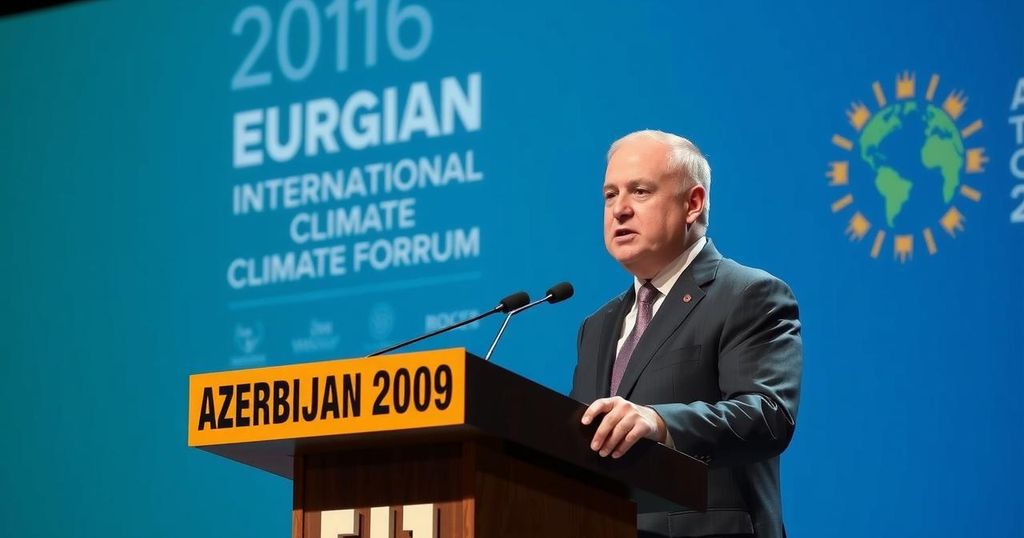Azerbaijan’s President Ilham Aliyev has drawn criticism for confrontational rhetoric during COP29, undermining the climate agenda. His remarks have sparked diplomatic outrage, particularly from France and the EU, raising concerns about the nation’s commitment to climate goals and highlighting a troubling reliance on fossil fuels. This approach casts doubt over the sincerity of Azerbaijan’s participation in climate discussions amidst ongoing human rights abuses.
President Ilham Aliyev of Azerbaijan has sparked significant controversy during the COP29 climate talks hosted in Baku, using fiery rhetoric that has overshadowed the global climate agenda. His confrontational speeches, where he publicly criticized Western nations as hypocrites and accused them of maintaining neocolonial relationships, have led to serious concerns regarding Azerbaijan’s commitment to international environmental goals. Aliyev’s relentless criticism extended towards European institutions, resulting in a diplomatic backlash from officials in France and the EU.
The summit witnessed heightened tensions after Aliyev’s remarks prompted French officials, including Ecology Minister Agnès Pannier-Runacher, to label his comments as “unacceptable” and inappropriate for the COP presidency, leading to her withdrawal from the talks in protest. The French Foreign Ministry called in Azerbaijan’s ambassador to express their grievances, while Azerbaijan retaliated by summoning France’s ambassador in a further escalating diplomatic row. This illustrates the fragile relations between Azerbaijan and European countries, exacerbated by Aliyev’s anti-colonial rhetoric.
Another focal point of controversy lies in Azerbaijan’s heavy advocacy for fossil fuels during the summit. In stark contrast to a genuine commitment to climate action, President Aliyev referred to fossil fuels as a “gift from God” and defended the country’s production of oil and gas, further indicating a lack of transparency regarding emissions reduction efforts. Additionally, state-owned SOCAR, which dominates the Azerbaijani energy sector, faces criticism for poor environmental standards, raising suspicions about the country’s intentions amidst human rights concerns, highlighted by alarming statistics of political prisoners within its borders.
These dynamics suggest that Azerbaijan may be utilizing the COP29 summit not only for climate discussions but also as a platform to pursue its geopolitical interests, particularly as its relations with France continue to sour in the aftermath of territorial conflicts. Aliyev’s dismissiveness towards civil society groups calling for boycotts, alongside his refusal to address concerns regarding human rights violations, exemplifies a troubling trend during these talks.
The ongoing COP29 climate talks represent a significant international effort to address climate change, and they typically emphasize cooperation among nations towards achieving shared environmental goals. However, President Aliyev’s confrontational approach is symptomatic of broader tensions between Azerbaijan and Western nations, particularly following geopolitical events such as Azerbaijan’s military actions in Nagorno-Karabakh. Relationships between Azerbaijan and European states, particularly France, have deteriorated sharply, complicating discussions on climate cooperation and casting doubt on Azerbaijan’s sincerity in addressing climate issues amidst its domestic challenges, especially concerning human rights.
The controversial rhetoric employed by President Aliyev at COP29 raises critical questions about Azerbaijan’s ability to foster a collaborative atmosphere needed for effective climate action. As a host nation, his confrontational stance not only alienates Western partners but also showcases a troubling trend where diplomatic engagements at such global platforms are tainted by geopolitical disputes. Coupled with Azerbaijan’s ongoing fossil fuel advocacy and lack of transparency regarding human rights issues, the future of meaningful climate discussions in Baku remains precarious and fraught with suspicion.
Original Source: www.euractiv.com






